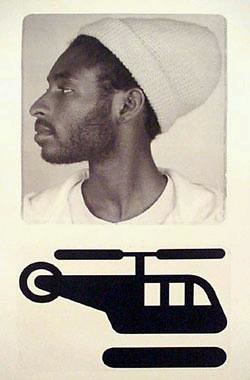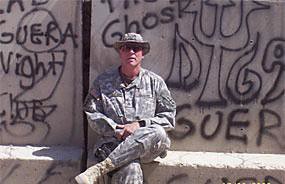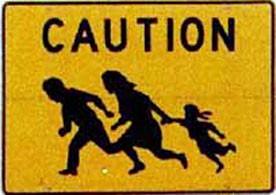Islam is at the heart of an emerging global anti-hegemonic culture that combines diasporic and local cultural elements, and blends Arab, Islamic, black and Hispanic factors to generate "a revolutionary black, Asian and Hispanic globalization, with its own dynamic counter-modernity constructed in order to fight global imperialism. (say what!)
Friday, June 02, 2006
celebrating puerto rico's black heritage
chavez brings hope to afro-venezuelans
Thursday, June 01, 2006
understanding pickaninnies and improving the race
"that's wells, not ellison, in case you feel like being cute again."
At one point, after describing how the central villain (played by Philip Seymour Hoffman) has been difficult to catch and is an "invisible man" Fishburne says to Crudd: "That's Wells, not Ellison, in case you feel like being cute again."
I'm sure I'm over-analyzing this (at least, I wouldn't claim that the author of the screenplay had any of this in mind) but I think it's more than just a coincidence that Ralph Ellison's novel about an African-American man who is hidden and ignored and H.G. Well's science-fiction novel about a man who is literally invisible share the same title. Invisibility (secrecy, hiding) is a major component of the Black condition. For example, Afro-Latino invisibility is almost a cliche at this point.
Check out: Afro-Colombians:'Invisible' People Strive to Survive War, Racism by Saeed Shabazz, Mestizaje and the Mexican Mestizo Self: No hay Sangre Negra, So There is No Blackness by Taunya Lovell Banks, In Peru, Afro-Descendants Fight Ingrained Racism, Invisibility by Angel Paez and then invisibility blues and tuning out blackness
But it actually goes deeper than that... a few years ago I wrote a poem which started off with the 'joke' that from time to time, all the Black people in the world have secret meetings where we review and plan for all the various manifestations and expressions of Black culture. (e.g. "we decide what sounds will drip down from ghetto blasters to suburban frat parties for the next ten years") And in the middle of working on that piece I started to come up with example after example of how secrecy and hiding show up as themes in black history. (e.g. "we hid pyramid construction instructions in hieroglyphics and guarded them with mummy curses", "we hid getaway plans inside of gospel hymns" "we hid orishas under white-washed saints" etc.) In a Western context (especially under slavery) where Black existence is precarious, it makes sense that we would place a premium on being able to communicate among ourselves without being understood by others.
In working on this poem, what really surprised me is how far back it was possible to take this idea. We can even go back to the most ancient Black man of the Western Canon, namely Noah's son Ham, and read these themes into his story. Specifically, Ham's 'original sin' was that he "uncovered his father's nakedness", in other words, he revealed something which should have remained hidden, and as a result his descendents were cursed with slavery. And so for me, Ham's parting advice to his children was "Not every true thing need be told".
Of course, the above description only goes so far, and is only true from a certain vantage point. I wouldn't want to essentialize and romanticize Black invisibility. We should just acknowledge that it plays a large role, but then ultimately move past it.
Wednesday, May 31, 2006
the wrath of farrakhan
Tuesday, May 30, 2006
jesus isn't magic
Monday, May 29, 2006
the native orientalists aka "it's easy out here for a sell-out"
best of friends, worlds apart
When I first skimmed this article I thought it was a gimicky human-interest story, but after rereading it, I saw that it was more nuanced than that. It gets into both the positive and negative aspects of race relations in Cuba and looks at the factors which can "guide" Cuban immigrants (whether black or white) to find a place in the US' system of racial identity.
The article made me think of an uncle who once told me that white Cubans were the most racist people on Earth. I would have expected a piece like this to oversimplify and paint a picture of two best friends living in a racial utopia coming to the US and suddenly growing apart. But the article did a half-way decent job of showing that many of the attitudes held by white Cubans in Miami weren't just a result of Americanization but came with them in their luggage (especially when presenting the perspective of Bill Brent, the former Black Panther living in Cuba).
Friday, May 26, 2006
terms of use
(Actually, the guy posing in the above picture is a pretty cool and amazing artist in his own right named Umi Vaughan. He's from Oakland but last I heard he was chillin' in Cuba, presumably working on an anthropology doctorate. If I get my thoughts together I'll say more about him, an interesting guy. Se hizo santo!).
Thursday, May 25, 2006
daara j brings rap back to its african roots
Despite the urgent nature of the material, ''Boomerang" is brimming with optimism. Daara J -- which means ''school of life" -- weds buoyant Afro-Cuban rhythms, crisp hip-hop grooves, and soulful R&B vocals to lyrics that tumble out in a celebratory cultural stew of French, English, Spanish, and their native Wolof.
The album's title refers to the group's belief that hip-hop was, if not born, at least seeded in Africa. ''When we were taken from Africa to be slaves and sent to all parts of the world, a form of rap called tasso, which is rhythm-based storytelling, already existed," explains Freddy. ''When it left the motherland, it remained dormant for a while. And then one day it was awakened. African-Americans forgot where it originally came from. It was a natural evolutionary process for it to come back to Africa, where we have developed it further!"
an apology to james yee
While Yee was stationed in Guantanamo as a chaplain to the detainees, he was charged with spying, threatened with the death penalty, put in solitary confinement, and tortured until the Army decided to drop the charges. He subsequently resigned his commission. If you are unfamiliar with his story, I urge you to listen to him or read his account at Democracy Now! . He has just published a book about his experiences called For God and Country: Faith and Patriotism Under Fire.
Monday, May 22, 2006
juan cole on the da vinci code
Sunday, May 21, 2006
the religious left is back
gangs claim their turf in iraq
The Gangster Disciples, Latin Kings and Vice Lords were born decades ago in Chicago's most violent neighborhoods. Now, their gang graffiti is showing up 6,400 miles away in one of the world's most dangerous neighborhoods -- Iraq.
There are at least two sides to this: What are the implications of having gang-affiliated soldiers in Iraq? (But actualy, this doesn't seem to be a big concern because in Iraq, the American soldiers, even those in rival gangs, are united by a common enemy.) The larger issue is what happens in urban areas when gang members go back home with military know-how and access to equipment? Can we say blowback?
us secretly backing warlords in somalia
The latest clashes, last week and over the weekend, were some of the most violent in Mogadishu since the end of the American intervention in 1994, and left 150 dead and hundreds more wounded. Leaders of the interim government blamed U.S. support of the militias for provoking the clashes.
The country has a weak transitional government operating largely out of neighboring Kenya and the southern city of Baidoa. Most of Somalia is in anarchy, ruled by a patchwork of competing warlords; the capital is too unsafe for even Somalia's acting prime minister to visit.
Leaders of the transitional government said they have warned U.S. officials that working with the warlords is shortsighted and dangerous.
"We would prefer that the U.S. work with the transitional government and not with criminals," the prime minister, Ali Mohamed Gedi, said in an interview. "This is a dangerous game. Somalia is not a stable place and we want the U.S. in Somalia. But in a more constructive way. Clearly we have a common objective to stabilize Somalia, but the U.S. is using the wrong channels."
Many of the warlords have their own agendas, Somali officials said, and some reportedly fought against the United States in 1993 during street battles that culminated in an attack that downed two U.S. Black Hawk helicopters and left 18 Army Rangers dead.
"The U.S. government funded the warlords in the recent battle in Mogadishu, there is no doubt about that," government spokesman Abdirahman Dinari told journalists by telephone from Baidoa. "This cooperation . . . only fuels further civil war."
U.S. officials have refused repeated requests to provide details about the nature and extent of their support for the coalition of warlords, which calls itself the Alliance for the Restoration of Peace and Counter-Terrorism in what some Somalis say is a marketing ploy to get U.S. support.
Saturday, May 20, 2006
blog break
Tuesday, May 16, 2006
el emigrante
I could have made this another "why the devil has more vacation-time than santa" post but later changed my mind about the title. A few days ago I read an article about a racist video game called Border Patrol (available free online) where the objective was to shoot Mexicans trying to cross the border; you could kill a "drug smuggler" a "mexican nationalist" or a "breeder" (a pregnant woman with two children). In the course of looking for the game I also found Krazie Bone's Ghetto Chase where the player runs from the police through various backyards (collecting crack pipes and marijuana leaves for extra points), Kaboom! The Suicide Bombing Game (pretty self-explanatory) along with many other games in a similar vein. On some level, I've known for a while that video games have been pushing the envelope and getting more and more extreme, but I'm actually (a little) surprised by how many games out there are racist, stereotypical, crudely violent and offensive. It makes me feel old and crotchety.
For a more academic look at the border patrol game, read Buzzle.com's "Border Patrol" Video Game: Appalling Social Irresponsibility
And for a slightly different sort of game, check out El Emigrante where you get to be a Mexican mouse (Speedy Gonzalez?) on a bicycle fleeing from the police. It is different from Border Patrol in that the player identifies with the immigrant and it is different from Kaboom and Ghetto Chase in that it doesn't blatantly employ stereotypes. In contrast with the previous games, El Emigrante isn't racially offensive but it is deafeatist. (There is no way to win. The immigrant always gets caught, it's just a matter of time).
What do you think?
Monday, May 15, 2006
nommo
star spangled hypocrite
From the Black Commentator: Star spangled hypocrite features links to a Spanish version of the Star-spangled banner commissioned by the U.S. Bureau of Education in 1919, four different Spanish versions of the anthem available on the U.S. State Department's website, and news accounts of a certain someone apparently having no problem with Spanish versions of the national anthem when pandering to Latino voters on the campaign trail.


